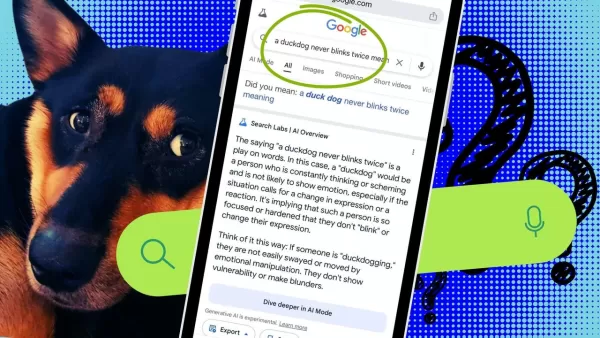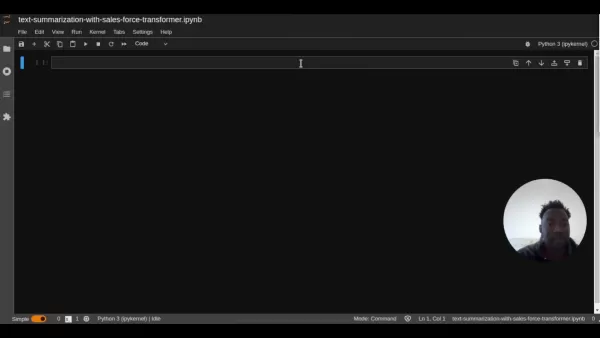People are Googling fake sayings to see AI Overviews explain them - and it's hilarious

Google's AI Overviews are making headlines once again, and not for the first time. Remember those bizarre recipes like glue pizza and gasoline spaghetti that went viral about a year ago? Well, it seems Google's AI-powered search summaries are back in the spotlight, and this time, it's for generating fake idioms.
Here's how it works: head over to Google and search for a made-up idiom. Keep it simple and don't ask for an explanation or backstory. Just type something like "A barking cat can't put out a fire," "You can't make grape jelly from an avocado," or "Never give your pig a dictionary." Adding "meaning" at the end might help, too.
What's fascinating is that Google will not only confirm that your invented saying is real, but it will also concoct a definition and an origin story. The results can be downright hilarious.
The Duckdog Test
Curious to see if this theory held water, I took to Google and searched for a phrase my coworker coined about her dog, Duckdog: "A duckdog never blinks twice."
Google's AI promptly responded, explaining that this humorous phrase, not meant to be taken literally, signified that "a duck dog, or a duck-like dog, is so focused that it never blinks even twice." It even spun a plausible tale: some ducks sleep with one eye open, so a dog hunting a duck must be even more vigilant.
Impressed, I searched the same phrase again, only to find the story had morphed entirely. Now, the saying meant something so unusual or unbelievable that it was hard to accept, even when presented as fact. It was tied to a duck-dog hybrid, of all things!
Another search yielded yet another explanation, and you can see it above, along with the star of the fake idiom himself.
While Google's AI Overviews can be handy for quick answers, this trend shows they're not always reliable. So, take those AI-generated snippets with a grain of salt.
Want to stay updated with the latest tech news? Sign up for our Tech Today newsletter and get the morning's top stories delivered straight to your inbox!
Related article
 How ChatGPT Works: Capabilities, Applications, and Future Implications
The rapid evolution of artificial intelligence is transforming digital interactions and communication. Leading this transformation is ChatGPT, an advanced conversational AI that sets new standards for natural language processing. This in-depth examin
How ChatGPT Works: Capabilities, Applications, and Future Implications
The rapid evolution of artificial intelligence is transforming digital interactions and communication. Leading this transformation is ChatGPT, an advanced conversational AI that sets new standards for natural language processing. This in-depth examin
 Salesforce’s Transformer Model Guide: AI Text Summarization Explained
In an era where information overload is the norm, AI-powered text summarization has become an indispensable tool for extracting key insights from lengthy documents. This comprehensive guide examines Salesforce's groundbreaking AI summarization techno
Salesforce’s Transformer Model Guide: AI Text Summarization Explained
In an era where information overload is the norm, AI-powered text summarization has become an indispensable tool for extracting key insights from lengthy documents. This comprehensive guide examines Salesforce's groundbreaking AI summarization techno
 Generate Unique Brand Names Instantly with Namflix AI Business Name Generator - Free Tool!
Crafting Your Perfect Brand Identity with AIIn today's competitive digital marketplace, establishing a distinctive brand identity starts with choosing the perfect name - one that captures your unique value proposition while resonating with your targe
Comments (5)
0/200
Generate Unique Brand Names Instantly with Namflix AI Business Name Generator - Free Tool!
Crafting Your Perfect Brand Identity with AIIn today's competitive digital marketplace, establishing a distinctive brand identity starts with choosing the perfect name - one that captures your unique value proposition while resonating with your targe
Comments (5)
0/200
![TimothyWilliams]() TimothyWilliams
TimothyWilliams
 September 14, 2025 at 6:30:37 AM EDT
September 14, 2025 at 6:30:37 AM EDT
lmao this is golden 🤣 people really out here testing AI with fake quotes like 'Shakespeare invented TikTok dances'...Google needs to step up their fact-checking game ASAP! #AIFails


 0
0
![BruceMartínez]() BruceMartínez
BruceMartínez
 August 20, 2025 at 1:01:20 PM EDT
August 20, 2025 at 1:01:20 PM EDT
LOL, Google's AI is at it again with fake sayings! 🤣 I tried googling 'the moon is made of cheese' and the AI explanation was wild. It's like watching a sci-fi comedy unfold in real-time. Keep feeding it nonsense, folks!


 0
0
![EricKing]() EricKing
EricKing
 August 12, 2025 at 1:01:00 PM EDT
August 12, 2025 at 1:01:00 PM EDT
This AI Overview thing is wild! People trolling Google with fake sayings and getting absurd explanations is pure comedy gold. 😂 I tried one myself, and it confidently explained a made-up proverb like it was ancient wisdom. Gotta love how AI just rolls with it!


 0
0
![ArthurThomas]() ArthurThomas
ArthurThomas
 August 6, 2025 at 9:01:06 PM EDT
August 6, 2025 at 9:01:06 PM EDT
LOL, Google's AI is at it again with these fake sayings! I tried googling 'clouds are just lazy fog' and the explanation was pure comedy gold. Anyone else testing this? 😂


 0
0
![KeithLopez]() KeithLopez
KeithLopez
 August 4, 2025 at 4:40:05 AM EDT
August 4, 2025 at 4:40:05 AM EDT
LOL, Google's AI is at it again with these fake sayings! I tried googling 'the moon is made of spare ribs' and the AI explanation was pure comedy gold. It's like watching a robot try to explain a joke it doesn’t get. Anyone else testing this? 😄


 0
0

Google's AI Overviews are making headlines once again, and not for the first time. Remember those bizarre recipes like glue pizza and gasoline spaghetti that went viral about a year ago? Well, it seems Google's AI-powered search summaries are back in the spotlight, and this time, it's for generating fake idioms.
Here's how it works: head over to Google and search for a made-up idiom. Keep it simple and don't ask for an explanation or backstory. Just type something like "A barking cat can't put out a fire," "You can't make grape jelly from an avocado," or "Never give your pig a dictionary." Adding "meaning" at the end might help, too.
What's fascinating is that Google will not only confirm that your invented saying is real, but it will also concoct a definition and an origin story. The results can be downright hilarious.
The Duckdog Test
Curious to see if this theory held water, I took to Google and searched for a phrase my coworker coined about her dog, Duckdog: "A duckdog never blinks twice."
Google's AI promptly responded, explaining that this humorous phrase, not meant to be taken literally, signified that "a duck dog, or a duck-like dog, is so focused that it never blinks even twice." It even spun a plausible tale: some ducks sleep with one eye open, so a dog hunting a duck must be even more vigilant.
Impressed, I searched the same phrase again, only to find the story had morphed entirely. Now, the saying meant something so unusual or unbelievable that it was hard to accept, even when presented as fact. It was tied to a duck-dog hybrid, of all things!
Another search yielded yet another explanation, and you can see it above, along with the star of the fake idiom himself.
While Google's AI Overviews can be handy for quick answers, this trend shows they're not always reliable. So, take those AI-generated snippets with a grain of salt.
Want to stay updated with the latest tech news? Sign up for our Tech Today newsletter and get the morning's top stories delivered straight to your inbox!
 How ChatGPT Works: Capabilities, Applications, and Future Implications
The rapid evolution of artificial intelligence is transforming digital interactions and communication. Leading this transformation is ChatGPT, an advanced conversational AI that sets new standards for natural language processing. This in-depth examin
How ChatGPT Works: Capabilities, Applications, and Future Implications
The rapid evolution of artificial intelligence is transforming digital interactions and communication. Leading this transformation is ChatGPT, an advanced conversational AI that sets new standards for natural language processing. This in-depth examin
 Salesforce’s Transformer Model Guide: AI Text Summarization Explained
In an era where information overload is the norm, AI-powered text summarization has become an indispensable tool for extracting key insights from lengthy documents. This comprehensive guide examines Salesforce's groundbreaking AI summarization techno
Salesforce’s Transformer Model Guide: AI Text Summarization Explained
In an era where information overload is the norm, AI-powered text summarization has become an indispensable tool for extracting key insights from lengthy documents. This comprehensive guide examines Salesforce's groundbreaking AI summarization techno
 Generate Unique Brand Names Instantly with Namflix AI Business Name Generator - Free Tool!
Crafting Your Perfect Brand Identity with AIIn today's competitive digital marketplace, establishing a distinctive brand identity starts with choosing the perfect name - one that captures your unique value proposition while resonating with your targe
Generate Unique Brand Names Instantly with Namflix AI Business Name Generator - Free Tool!
Crafting Your Perfect Brand Identity with AIIn today's competitive digital marketplace, establishing a distinctive brand identity starts with choosing the perfect name - one that captures your unique value proposition while resonating with your targe
 September 14, 2025 at 6:30:37 AM EDT
September 14, 2025 at 6:30:37 AM EDT
lmao this is golden 🤣 people really out here testing AI with fake quotes like 'Shakespeare invented TikTok dances'...Google needs to step up their fact-checking game ASAP! #AIFails


 0
0
 August 20, 2025 at 1:01:20 PM EDT
August 20, 2025 at 1:01:20 PM EDT
LOL, Google's AI is at it again with fake sayings! 🤣 I tried googling 'the moon is made of cheese' and the AI explanation was wild. It's like watching a sci-fi comedy unfold in real-time. Keep feeding it nonsense, folks!


 0
0
 August 12, 2025 at 1:01:00 PM EDT
August 12, 2025 at 1:01:00 PM EDT
This AI Overview thing is wild! People trolling Google with fake sayings and getting absurd explanations is pure comedy gold. 😂 I tried one myself, and it confidently explained a made-up proverb like it was ancient wisdom. Gotta love how AI just rolls with it!


 0
0
 August 6, 2025 at 9:01:06 PM EDT
August 6, 2025 at 9:01:06 PM EDT
LOL, Google's AI is at it again with these fake sayings! I tried googling 'clouds are just lazy fog' and the explanation was pure comedy gold. Anyone else testing this? 😂


 0
0
 August 4, 2025 at 4:40:05 AM EDT
August 4, 2025 at 4:40:05 AM EDT
LOL, Google's AI is at it again with these fake sayings! I tried googling 'the moon is made of spare ribs' and the AI explanation was pure comedy gold. It's like watching a robot try to explain a joke it doesn’t get. Anyone else testing this? 😄


 0
0





























